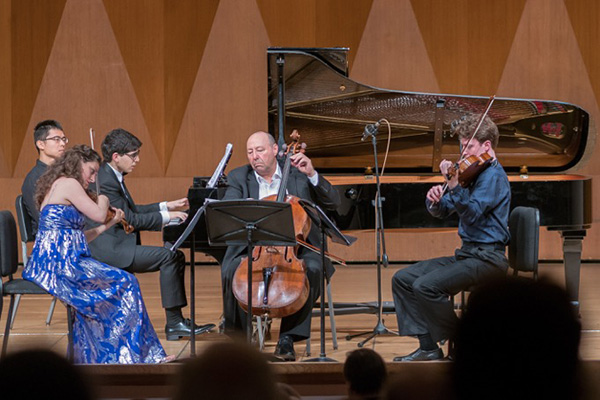by David Kulma

After 11-year-old violinist Corina and 16-year-old pianist Athena wonderfully played the first three of Dvořák’s Four Romantic Pieces, Op. 75, their astonishing rendition of Maurice Ravel’s Tzigane left me speechless. The sisters play as if they are seasoned professionals — Athena brought suave precision to the complex accompaniment, while Corina handled the virtuosic music with poise, confidence, and the skill one expects from someone more than twice her age. Look out for these young women.
Bernstein’s Clarinet Sonata (1942) was his first published work. Its two movements — the first clearly indebted to Paul Hindemith, the second to Aaron Copland — are filled with Bernstein’s more mature hallmarks: a jazz-flavored rhythmic vitality and ingratiatingly songful melodies. Clarinetist Franklin Cohen and pianist Evren Ozel played this exciting work with great care and brio. Ozel’s fantastic touch gave the pearly piano part ample clarity, while Cohen displayed his well-known musicality — beautiful phrasing, flying fingers, and a light vibrato at touching moments.
The title of Adams’s Shaker Loops joins the idea of oscillating music, the religious frenzy of the Shaker community, and the technique of looping magnetic tape into circles. Applied to a string septet — here played by violinists David Bowlin, Yura Lee, and Diana Cohen, violist Tanner Menees, cellists Oliver Herbert and Peter Wiley, and bassist Will Langlie-Miletich — Adams concocted a constantly changing, emotionally sweeping minimalist classic.
The ChamberFest musicians gave a well-judged performance full of wonderful long dynamic shapes, giving this reviewer goosebumps. The brilliance of their rendition was amplified by creating such a cohesive reading without a conductor.
Written at the height of his powers in 1889, the three movements of Dvořák’s Piano Quartet, Op. 23 are full of his signature luscious tunes inspired by Czech folk music. His love of spinning out repetitive sequences never lets you forget the main motive. Diana Cohen, Menees, Wiley, and Ozel gave an impassioned performance, fully engaged in this Brahms-tinged Romantic chamber music.
Musicians usually pull out all the stops for this style, including full-throated vibrato and plentiful section-marking rubato. These players showed that Dvořák deserves this loving, impassioned treatment. The finale, inspired by the Czech furiant dance, is the best of the bunch. While lovely and beautiful, the first two movements overstay their welcome.
Published on ClevelandClassical.com June 25, 2019.
Click here for a printable copy of this article


